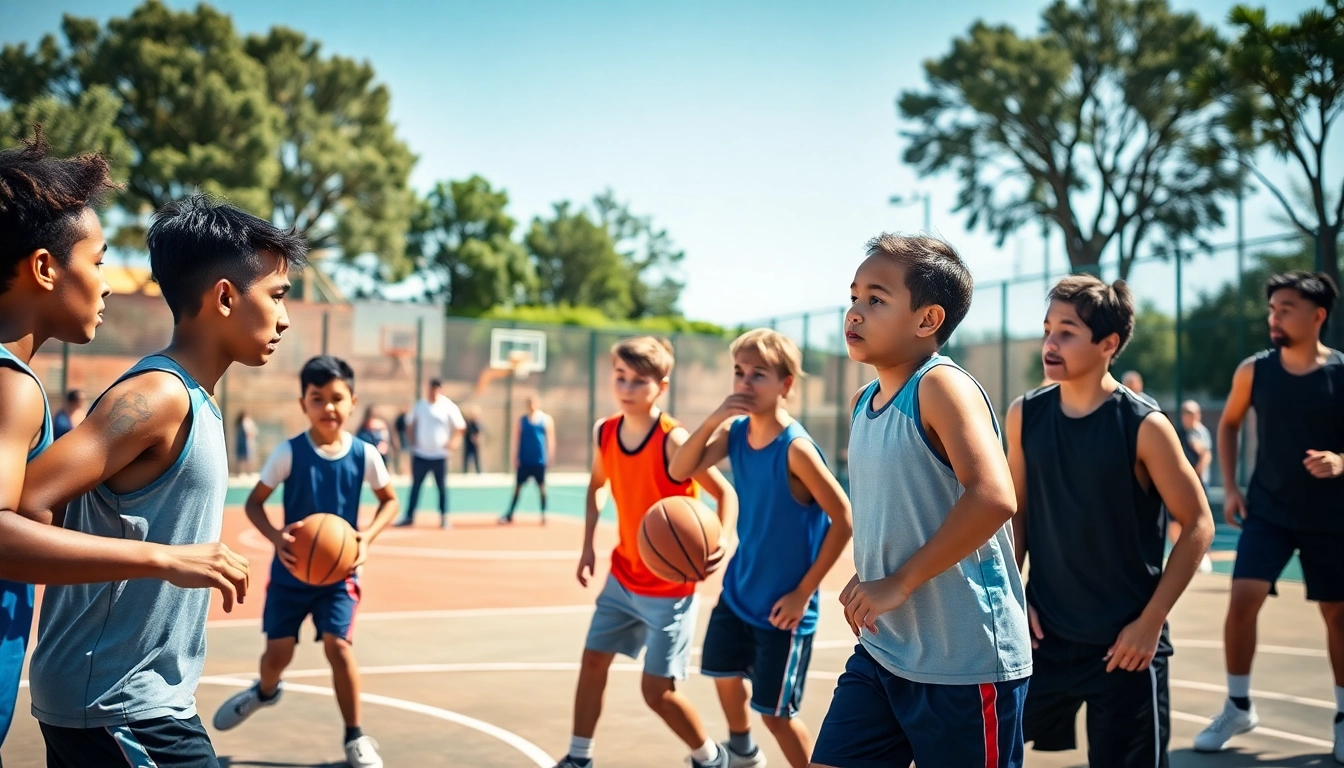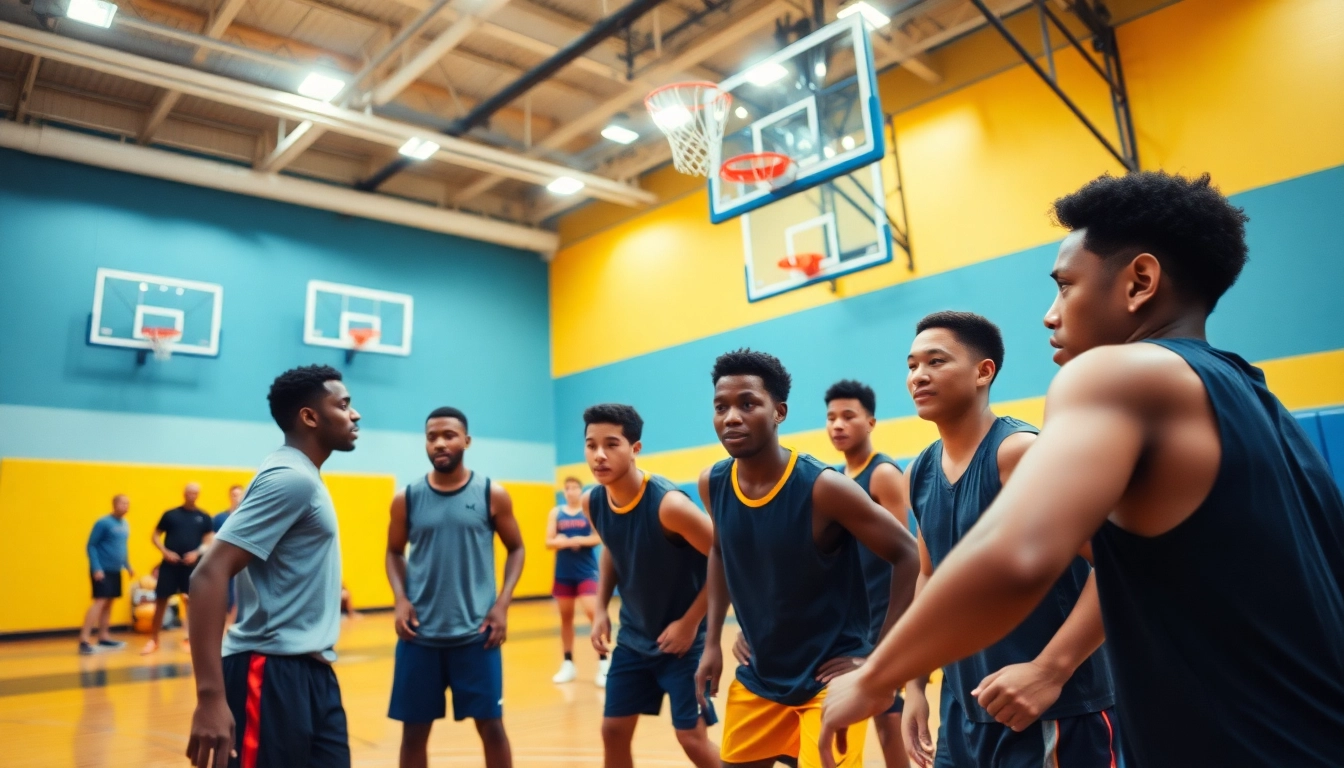Understanding Basketball Training Programs
Definition and Importance of Basketball Training
Basketball training encompasses a series of structured programs and drills that aim to develop players’ skills, fitness, and game understanding. Whether you’re a novice taking your first steps on the court or a seasoned player looking to sharpen your skills, engaging in a dedicated training program is paramount. Such programs do not merely enhance physical abilities; they also foster mental resilience, strategic understanding, and team dynamics.
In an age where basketball has evolved into a highly competitive sport, understanding the specific nuances of the game through training becomes crucial. A well-rounded training program factors in various elements, from physical conditioning to skill development, making it an invaluable part of every basketball player’s journey. Moreover, regardless of age and skill level, embracing best basketball training programs can lead to significant improvements over time.
Types of Training Programs Available
Basketball training programs can be categorized into several distinct types, each catering to different aspects of the game:
- Skill Development Camps: These typically include specialized training for shooting, ball handling, passing, and defensive skills. Coaches emphasize repetitive drills that ensure muscle memory is ingrained.
- Strength and Conditioning Programs: These focus on building physical capacity to improve performance on the court. They often include strength training, agility drills, and cardiovascular conditioning.
- Position-Specific Training: As the game is diverse, training catering to specific positions—like point guard or center—helps players hone the skills necessary to excel in their designated roles.
- In-Season and Off-Season Training: These programs adjust depending on whether it’s the competitive season or a training/recovery period. They often focus on maintaining fitness during the season and building strength in the off-season.
- Online Training Programs: With advances in technology, many athletes are turning to online platforms that offer virtual training sessions, tailored workouts, and performance tracking.
Key Components of Effective Training
Regardless of the type of training program, several key components determine its effectiveness:
- Individual Assessment: Understanding each player’s strengths and weaknesses is fundamental. This assessment helps tailor a training program that meets specific needs, ensuring effective skill advancement.
- Progress Tracking: Evaluating growth through consistent tracking of performance metrics, attendance, and feedback enables players to see their improvements and establish new goals.
- Adaptability: An effective program should evolve based on the feedback from players and coaches, incorporating changes as needed to optimize training results.
- Engagement: Keeping participants motivated and engaged can drastically improve commitment and participation. This can be fostered through varying training routines and incorporating competitive elements.
Evaluating the Best Basketball Training Programs
Criteria for Selecting a Training Program
When searching for the best basketball training programs, it’s essential to evaluate them against certain criteria to ensure they meet your needs:
- Accreditation and Expertise: Look for programs led by qualified coaches with proven track records in player development.
- Program Structure: A well-organized program should clearly outline objectives, methodologies, and training schedules to ensure efficient use of time.
- Player Reviews and Success Stories: Testimonials from former participants can provide insight into the program’s effectiveness and overall participant satisfaction.
- Accessibility: Consider the location of in-person programs or the ease of use of online training platforms.
- Cost vs. Value: Assess the pricing structure relative to the quality of training provided, ensuring that it aligns with your budget and development goals.
Comparative Analysis of Top Competitors
To stand out in the competitive landscape, leading basketball training programs have unique offerings tailored to diverse needs:
- Evolution Basketball Training: Located in Virginia and Maryland, this program emphasizes year-round skill development with a proven track record of developing over 500 college players. They provide specialized clinics and camps focused on both skill and competitive play.
- Pro-Fit Basketball Training: This program offers tailored training for players at all skill levels, focusing on small group training to provide individualized attention crucial for skill enhancement. Their structured camps and personal coaching refine player abilities through comprehensive drills.
- Pure Sweat Basketball: Featuring Drew Hanlen’s Virtual Skills School, this program offers digital training options that combine skill drills with analytical feedback. It’s designed for players and coaches of all levels, emphasizing tailored experiences for skill development.
User Reviews and Testimonials
Feedback from participants is crucial in assessing the quality of training programs. Reviews can range from firsthand experiences of skill development to overall satisfaction with the training environment. For example, users often remark on:
- Skill Gaps Addressed: Players frequently praise programs that successfully identify and work through their weaknesses, showcasing tangible results in their gameplay.
- Coaching Quality: Many testimonials emphasize the expertise and motivational skills of coaches, making training both effective and enjoyable.
- Community Environment: Positive feedback about the camaraderie among players signifies that programs successfully foster a sense of teamwork and motivation.
Getting Started: Preparing for Training
Assessing Your Current Skill Level
Before embarking on a training regime, it’s essential to conduct a thorough self-assessment of your current skills. This can involve:
- Skills Self-Evaluation: Honest self-reflection on skills like shooting accuracy, defensive capabilities, and ball handling.
- Performance Metrics: Keeping track of past game performances, stats, and effectiveness in various game situations provides insight into areas of strength and weakness.
- Feedback from Coaches: Seeking advice or assessments from coaches can offer a clearer picture of where to focus improvement efforts.
Setting Realistic Goals for Improvement
Once players assess their current skill set, setting achievable and specific goals becomes vital. Effective goals follow the SMART criteria:
- Specific: Clearly define what aspects of your game you wish to improve.
- Measurable: Set quantifiable targets (e.g., improving free throw percentage by 10%).
- Achievable: Ensure that the goals are attainable given your current skill level.
- Relevant: Goals should align with long-term objectives and the demands of the basketball position you aspire to.
- Time-bound: Establish a timeline for achieving your goals, instilling accountability and urgency.
Essential Gear and Equipment Needed
Equipping yourself with the essential gear can enhance your training experience. Key items include:
- Balls: Quality basketballs suited for the type of training—indoor or outdoor—are fundamental.
- Sneakers: Proper footwear that provides support, traction, and comfort minimizes injury risk.
- Training Aids: Items like agility cones, resistance bands, and shooting sleeves can help enhance specific skills.
- Workout Wear: Comfortable, breathable clothing supports performance and mobility on the court.
Common Challenges in Basketball Training
Overcoming Mental Barriers
Mental hurdles can significantly impact a player’s performance and willingness to engage in training. Common barriers include:
- Fear of Failure: This common concern can inhibit a player’s willingness to take risks on the court. To counter this, fostering a growth mindset and focusing on learning from mistakes can encourage progress.
- Performance Anxiety: Players often face pressure to perform well during training sessions. Techniques such as visualization and mindfulness can help reduce anxiety levels and boost confidence.
Adapting to Diverse Training Styles
Every training program has a unique approach, which may take time for players to adjust to. Strategies for adapting include:
- Open-mindedness: Embrace varying coaching styles and methodologies to extract valuable insights from each experience.
- Communication: Engage with coaches to clarify expectations or express concerns about aspects of training, fostering a collaborative relationship.
Balancing Training with Other Commitments
For many athletes, balancing training with academic or work responsibilities can be challenging. Strategies to navigate this include:
- Effective Scheduling: Use calendars to allocate specific times for workouts and training, ensuring that commitments don’t interfere with practice.
- Prioritize Tasks: Assess which training sessions or areas are critical for achieving immediate goals and focus energies accordingly.
Maximizing the Benefits of Training
Tracking Progress and Setting New Goals
Regularly documenting progress enables players to establish new goals and fine-tune skill development efforts. This may involve:
- Journals: Keeping a training journal to note down drills, workouts, and personal reflections helps inform future training decisions.
- Video Analysis: Recording plays or drills for later review can highlight areas of improvement and accomplishments alike.
Incorporating Feedback for Continuous Improvement
Feedback from coaches, peers, or self-evaluations are vital for adapting training methods. Incorporating feedback can be done through:
- Constructive Feedback: Embrace critiques positively to fine-tune skills. Understanding feedback can lead to heightened performance.
- Peer Reviews: Collaborating with teammates for cross-analysis can provide unique perspectives on performance.
Engaging with the Basketball Community
Being part of a basketball community can greatly enhance a player’s training experience by providing support, camaraderie, and opportunities for learning. Strategies for engagement include:
- Joining Local Teams: Participating in community leagues or clubs fosters a sense of belonging and offers platforms to apply skills in real-game situations.
- Online Forums and Social Media: Engaging with fellow basketball enthusiasts on platforms like Reddit or basketball-specific forums can provide additional insights and training tips.
- Participation in Clinics and Workshops: Taking part in local basketball clinics broadens exposure to different coaching styles and creates networking opportunities.



